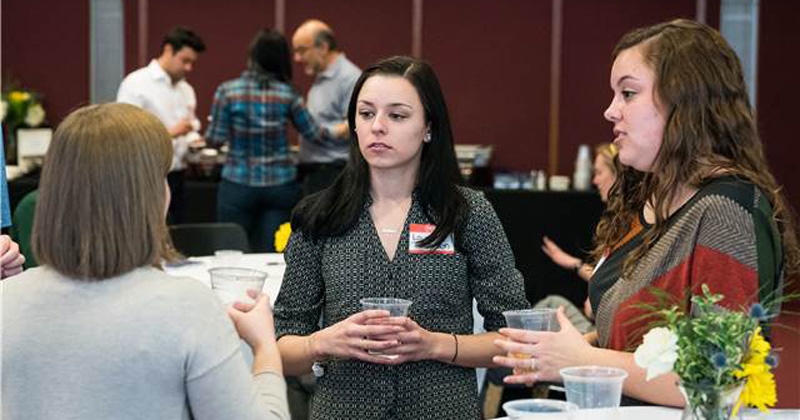


CEOE job fair prepares students for life after graduation
Photo by Michael Graw April 25, 2018
Geo Job Fair and Marine Science class guide students toward success
Ask a college student what their plans are for life after graduation, and you would likely come up with one of two answers: “I have no idea,” or “get a job.” In the face of an increasingly intimidating professional world, many students are at a loss not only as to what they want to do, but also how to go about doing it.
University of Delaware Professors Joanna York and Claire O’Neal of the School of Marine Science & Policy and the Department of Geological Science, respectively, are attempting to solve this problem by educating students on what their post-graduation options are and giving them tools and opportunities to pursue them.
The Geo-Job Fair: “speed dating” for employers
The third annual Geo Job Fair was held April 13. Event organizer Claire O’Neal structured a two-part event: a networking luncheon attended by students and potential employers in the environmental geosciences, followed by interview opportunities for attendants with participating employers. Twelve different firms or organizations were in attendance, many represented by employees who are alumni of UD’s geology, environmental science, or engineering programs.
Celine Cumming of BrightFields, Inc., attended the same event last year as a senior geology major. This year she did the interviewing alongside BrightFields owner, Marian Young. Young reinforced the value the interviews have for the students and the benefit to their company in the “speed-dating” approach of having back-to-back interviews with many students all in one afternoon, as many as 10 in four hours.
“Interviewing is really stressful for the students. So it’s good for them to get practice and meet people they’re going to talk with first in a more casual setting,” Young said. “It’s really fast, people come in and we tell them everything about us and our company, they tell us everything about themselves, and then boom, next person.”
O’Neal emphasized that majors like geology and environmental science, the event’s target audience, are not typically as well served by broader University career fairs.
Thanks to generous support from the Career Services Center via a Faculty and Staff Innovation Grant, O’Neal sought to minimize obstacles to employers by providing lunch, parking, and private interview space in exchange for their valuable time. She noted how successful the event has been for students in the past, citing that Environmental Alliance, Inc., BrightFields, Inc., and Hillis-Carnes, Inc., have attended every year, and that the event has always resulted in student hires.
Over the course of the year, O’Neal has also sponsored a number of professional development seminars led by guest speakers from the Delaware Geological Survey, the American Geosciences Institute and the owners of two regional environmental firms, both UD alumni. Geology students also learn about professional certification via the National Association of State Boards of Geology (ASBOG) licensing exam, the fee for which is paid by the department for all senior geology majors.
Marine science seminar provides road map to professional world
Every spring semester, juniors majoring in marine science are required to take MAST 301, a course designed to give them the tools to begin thinking about the next steps beyond their undergraduate degree.
Joanna York has been teaching this course since its inception. “My overarching goal is handing students both the knowledge and skills to enter the workforce in a science or policy-related field and have them be successful,” York said. “This course helps them land that next opportunity, so that they can take what they’ve learned here and do something exciting.”
Meeting once a week, each class hones in on a different subject—the difference between a resume and a CV, how to write a cover letter, or how to get funding for graduate school. York aims to give students the knowledge they need to effectively navigate the professional world on their own when the time comes.
“By briefly touching on a variety of areas, we give them a sense of what they need to be doing in the next year,” York said. “We start a year in advance so they can figure out what they’re going to be doing.”
Students quickly see the personal and professional benefits. Senior Matt Dunn, who will begin graduate study in oceanography at the University of Rhode Island this fall, said the course was essential in preparing him for the process of applying to grad school. Senior Ashley Barnett also cited the course as a key component in getting the full-time job she recently accepted with Environmental Consulting Service, Inc.
“The key to that class was that it forced me to be organized and get important application materials together, like a resume,” Barnett said, “while also learning how to make them stand out among other applicants' materials.”
Thinking about the future is an intimidating and overwhelming task for people in general, and for busy college students especially. Many students might feel anxiety at the thought of graduation day as they face the prospects of entering the workforce, applying to graduate school, or just generally moving onto a new phase of life. By providing these professional development opportunities, O’Neal, York, and the College of Earth, Ocean, and Environment are offering important resources and support to confront and overcome these anxieties while still here at UD.
Contact Us
Have a UDaily story idea?
Contact us at ocm@udel.edu
Members of the press
Contact us at mediarelations@udel.edu or visit the Media Relations website

